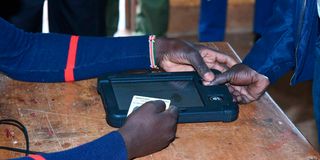Online voting during general elections would require Sh10bn

A voter is identified using a biometric kit before casting the ballot at Chebiemit Primary School Polling Station in Elgeyo Marakwet County, during the senatorial by-election on January 05, 2023.
It will cost taxpayers Sh10.7 billion to facilitate online voting during general elections.
The Elections (Amendment) Bill, 2024 seeks to amend the Elections Act, 2011, to incorporate a fully integrated electronic electoral system.
An analysis done by the Parliamentary Budget Office (PBO) has, however, revealed that taxpayers will have to fork out Sh10.7 billion to be phased out in three years for the country to realise the e-voting dream.
The analysis tabled before the National Assembly’s Budget and Appropriations office on Thursday says the money will fund various upgrades of the ICT system by the Independent Electoral and Boundaries Commission (IEBC).
Mbeere North MP Geoffrey Ruku has sponsored the Bill.
According to the breakdown provided by PBO, which advises Parliament on fiscal matters, there will be 52,481 stations in the 2027 general elections, which will cost taxpayers Sh44,870,000 million.
Requirements and costs
The electoral commission will therefore require a vote scanning machine in each of the polling stations which will come at a cost of Sh7, 872,150,000
According to the analysis, the IEBC will also be required to undertake modification and upgrade of its KIEMs and BVR system which will require Sh2.5 billion
Further, the electoral commission will also require a total of Sh140 million to undertake capacity building and awareness on the new technology where it’s estimated that it will train 1,000 staff at a cost of Sh20, 000 per day for seven days.
The commission will also undertake simulation and audit of the new technology at an estimated cost of Sh110 million.
The office says the money can be budgeted for in three phases of Sh3.5 billion over three financial years.
If passed, the Bill which seeks to amend Elections Act, 2011 will ensure that there will be no manual voting as all processes will be carried out electronically
The proposed legislation provides for the management, support and administration of electronic electoral systems.
Currently the Act provides for an integrated electronic system that enables biometric voter registration, electronic voter identification and electronic transmission of results.
However the electoral process is hybrid in nature as there are manual processes such as casting of physical ballot papers.
The new Bill however seeks to create a fully integrated electronic system where all processes will be carried out electronically including online voter-initiated registration system, electronic compilation of the register of voters, nomination of candidates and electronic voting in elections.
If passed, voting will be done by use of a printed machine-read and optically scanned ballot hence doing away completely with the manual voting.
In its report, the budget office told the committee that traditional manual voting is becoming too unsustainable since most of the processes across the world are now automated due to technological advancement.
“If enacted, this Bill is likely to accrue some benefits for the country since the commission is likely to enhance processing of the general election results in a more accurate, faster, transparent and verifiable manner,” reads the report.
The budget office however warned that the e-voting is likely to pose questions on the integrity of the elections due to increased cyber-attacks and hacking, unauthorised access to voting systems hence the government must invest extensively on the process to protect the democratic process.
“The government must spend extensively in safe and robust systems, deploy strong encryption measures and undertake frequent security assessments to prevent this danger,” reads the report.
The budget office also warned that e-voting may not provide the level of openness that citizens may require in an election.
It also raised issues with transparency and verifiability of the electoral processes.
The office told the committee that as much as the country will make some savings due to the termination of the use of physical ballot papers and boxes, the proposed elaborate technology may necessitate the acquisition of a new technological electoral system by the electoral commission.
Following the disputed 2007 general elections, the country formed the Kriegler Commission which came up with a recommendation on adoption of a biometric registration to aid in the verification of voters at polling stations.
The report by Kriegler Commission and the subsequent promulgation of the 2010 constitution introduced a number of changes including the enactment of the Independent Electoral and Boundaries Commission Act, the Elections Act 2011 and the Elections (Technology) Regulation, 2017 among other subsidiary legislation.
The enactment of these laws was meant to cure electoral inefficiencies such as the issue of ghost voters in order to promote transparency and fairness.
The enactment of these laws also allowed IBEC to deploy the Kenya Integrated Electoral Management Systems (Kiems) which compromises the Biometric Voter Registration, the Electronic Voter identification and the results transmission system during elections.
In the August 2022 general elections IEBC spent Sh5.344 million on ICT



